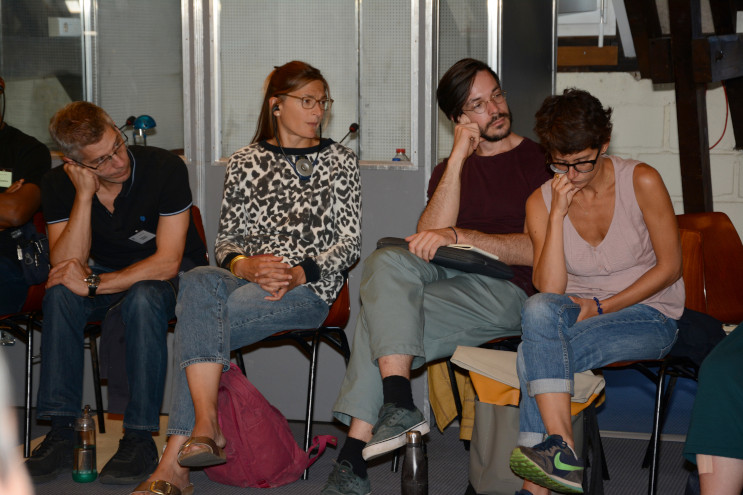Epistemic Injustice: What Is It and How Does It Relate to Poverty?

Above: Participants of ATD Fourth World’s social philosophy project.
This article is adapted from a talk given by Marie Garrau at a regional seminar in France. In this talk Garrau highlights the different forms of epistemic injustice and how they affect people in poverty. It is part of our series from ATD Fourth World’s Social Philosophy Project.

Increasing global understanding
 Epistemic injustice is an iniquity that relates to people as knowers. This means some people are unable to participate equally in the production, dissemination and circulation of knowledge (for example: transmitting information, sharing experiences and analyses, exchanging ideas with others, etc.). When we share what we know, we contribute to sustaining and increasing global knowledge. This is a fundamental aspect of our humanity, and all people need to be recognized as having the ability to produce knowledge and transmit it to others.
Epistemic injustice is an iniquity that relates to people as knowers. This means some people are unable to participate equally in the production, dissemination and circulation of knowledge (for example: transmitting information, sharing experiences and analyses, exchanging ideas with others, etc.). When we share what we know, we contribute to sustaining and increasing global knowledge. This is a fundamental aspect of our humanity, and all people need to be recognized as having the ability to produce knowledge and transmit it to others.
However, the production and transmission of some knowledge is hindered. Some people face a pattern of persistent and pervasive undermining of their experiences, knowledge, and contributions. This unfair treatment is epistemic injustice.
Miranda Fricker
The term “epistemic injustice” was coined by British philosopher Miranda Fricker in her 2007 book Epistemic Injustice: Power and the Ethics of Knowing. The book was inspired by numerous previous works on feminist and anti-racist theory, and in it Fricker describes two types of epistemic injustice.
Testimonial injustice
Testimonial injustice is where the knowledge, experiences, and contributions of some people are not believed due to negative stereotypes attached to their social group. For example, people living in poverty are often seen as lacking intelligence and education: consequently their contributions are frequently doubted and viewed with distrust or suspicion.
Hermeneutic injustice
Hermeneutic injustice is where an individual or group is unable to express their experiences due to a lack of common language. This happens through epistemic marginalization: that is, the difficulty accessing places where semantic and conceptual tools are produced, like schools. This epistemic marginalization results in gaps in common language that make it difficult for people in poverty to describe certain aspects of their experience.
For example, people in poverty are frequently the object of class prejudice, often being perceived as less intelligent, lazy, and unreliable. This has led to the coining of the term “aporophobia”, meaning the fear or hatred of people in poverty. The invention of this term made it possible to remedy a hermeneutical injustice: the absence of a word that can describe a central aspect of the lived experience of poverty. In the absence of such a word, this aspect of people in poverty’s experience remained difficult to understand, share, or even see.
These two categories of epistemic injustice developed by Fricker are valuable. Not being believed and not having the ‘right’ words to express one’s self constitute central aspects of the experience of marginalized groups . But as we look deeper, we see that other forms of epistemic injustice also exist, and must be taken into account.
Contributory injustice
Black American philosopher Kristie Dotson coined the term contributory injustice. She did this because while members of marginalized groups create terms to describe and understand their lives, these terms often aren’t known to the dominant group. This is a problem because it means that people in poverty aren’t taken seriously or listened to by dominant groups because of a gap in language. Their knowledge isn’t considered valid because the two groups do not share common words with the same meanings.
Epistemic appropriation
A fourth form of epistemic injustice is epistemic appropriation. It was notably theorized by the Black American philosopher Emmalon Davis. Epistemic appropriation occurs when knowledge produced by members of marginalized groups is disseminated throughout society but is, in the process, detached from those who created it. Those who disseminate the knowledge produced by members of marginalized groups then get disproportionate benefit from it.
An example of this is the Montessori teaching method. This method was invented as part of a cooperation between physician and educator Maria Montessori and the inhabitants of impoverished neighbourhoods of Rome. But today, while Montessori schooling is known throughout the world, its roots are forgotten. It is also mainly privileged social groups who benefit from the Montessori educational method. This a classic form of epistemic appropriation.
Injustice of transmission
Injustice of transmission is a fifth and final (known) form of epistemic injustice, brought to light as a result of ATD Fourth World’s Social Philosophy Project research. This injustice refers to the inability of some marginalized groups to transmit their history and knowledge to their children and future generations. It also symmetrically encompasses the inability of certain individuals and groups to inherit the history and knowledge of those who preceded them.
Injustice of transmission was highlighted by the experiences of children, from families in poverty, who were put into care. Care is sometimes necessary to protect children from violence, but it can also constitute a form of violence against children and parents to the extent that it makes transmission between one another impossible, and, with it, the passing of a shared history.
Epistemic injustice takes a variety of different forms. What each form has in common, however, is how they relate to people in poverty. Ultimately, they produce a specific effect on those who experience them: they produce harm.

